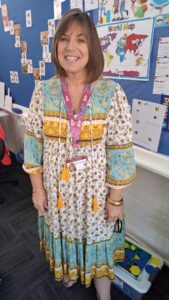“A Lot!” Helen’s Impact in a Multilingual Classroom
 Once a week, a subtle kind of magic happens in a brightly lit classroom at Dianella Primary School in Perth.
Once a week, a subtle kind of magic happens in a brightly lit classroom at Dianella Primary School in Perth.
There, amid a swirl of phonics flashcards, sing-song days of the week, and children calling out answers in accents shaped by distant homelands, sits Helen, a woman with no formal teaching background, but a heart big enough to span continents.
Helen volunteers in a class in the school’s Intensive English Centre, a safe and supportive space – even more so for children newly arrived in Australia. Some of these students have lived in refugee camps. Others may have spent long stretches in transit or detention. Most arrive with little or no English. But they bring with them resilience, spirit, and a desire to belong. And for many, Helen is one of the first people in this country to help them feel that they do.
“I get so much joy from working with the kids,” Helen says simply, when asked why she keeps coming back.
And the kids? When asked recently what Helen does for them, the response was instantaneous, and unanimous.
“A lot!” said 14 young voices in perfect chorus.
Helen is part of the Mercy Works Connect WA program, a volunteer-driven initiative supporting refugee and asylum-seeker children in schools. While she never trained as a teacher, her impact is undeniable. Glenda, the classroom teacher she supports, puts it this way: “She deserves an honorary teaching degree.”
In the Reception class, Helen works with students from all over the world: Syria, Afghanistan, Iran, China, Vietnam, India, Bhutan. Their first languages include Arabic, Dari, Tamil, Cantonese, and Burmese. But what unites them is the challenge of navigating a new language and a new life.
Helen helps bridge that gap.
A typical morning with the students starts with learning the basics of everyday conversation: the days of the week, months, seasons, greetings. These simple words are steppingstones to confidence and connection. From there, the lessons shift to phonics, vocabulary-building, and reading practice – always with visual aids, physical movement, and patience woven throughout.
Helen moves between small groups or sits beside individuals who need extra support. She adapts in the moment, explaining things in ways that click for each student. Sometimes it’s drawing pictures. Sometimes it’s repeating a word until it feels like a friend.
“She just gets it,” says Glenda. “She knows when a child needs a hand, a smile, or a moment of encouragement. Her calm and consistency bring a sense of security to the room.”
But Helen’s role goes beyond language. By showing up, week after week, she offers something even more powerful: belonging. In a world that can feel overwhelming for newly arrived children, she is a steady, reassuring presence and someone who sees them not as their trauma or their broken English, but as bright, capable learners with stories worth hearing.
Helen reflects humbly on her work: “I feel the program is a very effective way of providing support to the students and the school. The Intensive English Centre staff are an amazing group of teachers, and it’s wonderful to be part of what they do.”
She’s not in it for recognition. She’s there because she knows, intuitively, what Mercy Works has always believed – that connection is everything.
Now in its 25th year, Mercy Works continues to stand beside some of the most vulnerable members of our community and volunteers like Helen are the heartbeat of that mission.
The children she supports may not remember the spelling drills or the worksheets in years to come. But they will remember her kindness, her encouragement, and the way her eyes lit up when they got something right. They’ll remember that someone cared enough to sit beside them as they found their footing in a new land.
Helen’s story is a quiet one. There are no grand speeches, no dramatic breakthroughs. Just the slow, steady work of building trust, week by week, word by word.
And sometimes, that’s exactly the kind of story we need.
Because what she does, and what all Mercy Works Connect volunteers do, is simple but extraordinary.
She shows up. She listens. She believes.
And to a classroom full of children finding their voices, that means a lot.

 SHOP
SHOP




